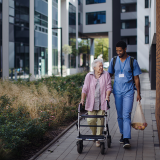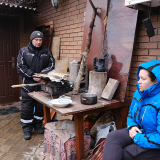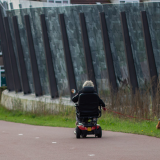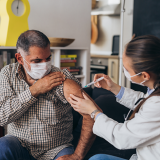
Condições e qualidade de vida
As condições e a qualidade de vida são uma das seis principais atividades do programa de trabalho da Eurofound para o período de 2021-2024. A Eurofound continuará a identificar e analisar os principais aspetos relacionados com a melhoria das condições de vida das pessoas na Europa, incluindo informações sobre a sua perceção da qualidade de vida e da sociedade. Uma vez que a pandemia da COVID-19 e a subsequente crise económica afetaram profundamente a vida das pessoas, a Eurofound continuará a investigar o impacto desta crise nos cidadãos da UE em diferentes fases da vida.
Durante o período de 2021-2024, a investigação da Eurofound proporcionará uma visão importante dos desafios e das perspetivas no domínio das condições e da qualidade de vida na UE, bem como do papel desempenhado por várias iniciativas destinadas a atenuar as dificuldades sociais de vários grupos de cidadãos. Revestem-se de especial interesse as implicações para os idosos e as necessidades de cuidados, a juventude e a sua inclusão social e mobilidade social, bem como as diferentes consequências da crise para os homens e as mulheres .
Os serviços públicos em toda a UE desempenharam um papel importante na resposta à crise da COVID-19, enfrentando simultaneamente desafios significativos, e serão avaliados com mais pormenor, centrando-se em questões como a qualidade, o acesso e a acessibilidade dos preços. Tal como demonstrado por constatações anteriores, a crise teve efeitos desproporcionados em determinados grupos, em função da idade, das responsabilidades familiares e da conciliação entre a vida profissional e a vida familiar , pelo que a Eurofound analisará mais aprofundadamente esta questão.
Em coordenação com o Instituto Europeu para a Igualdade de Género (EIGE), a Eurofound pretende investigar as disparidades multidimensionais entre géneros, investigando o impacto da crise da COVID-19 nos homens e nas mulheres em termos de participação no emprego, condições materiais de vida e bem-estar, a fim de identificar as diferenças e avaliar o seu efeito nas disparidades entre géneros.
- Infografia: Condições de vida e qualidade de vida na UE
« A qualidade dos serviços públicos tem sido fundamental para criar confiança nas instituições da Europa contemporânea e será crucial para enfrentar os desafios atuais e futuros. Os serviços de qualidade são também um domínio de inovação, especialmente na transição para serviços digitais mais respeitadores do ambiente e preparados para riscos, como a pandemia, no futuro.»
Tadas Leončikas, gestor principal de investigação, Unidade de Políticas Sociais































